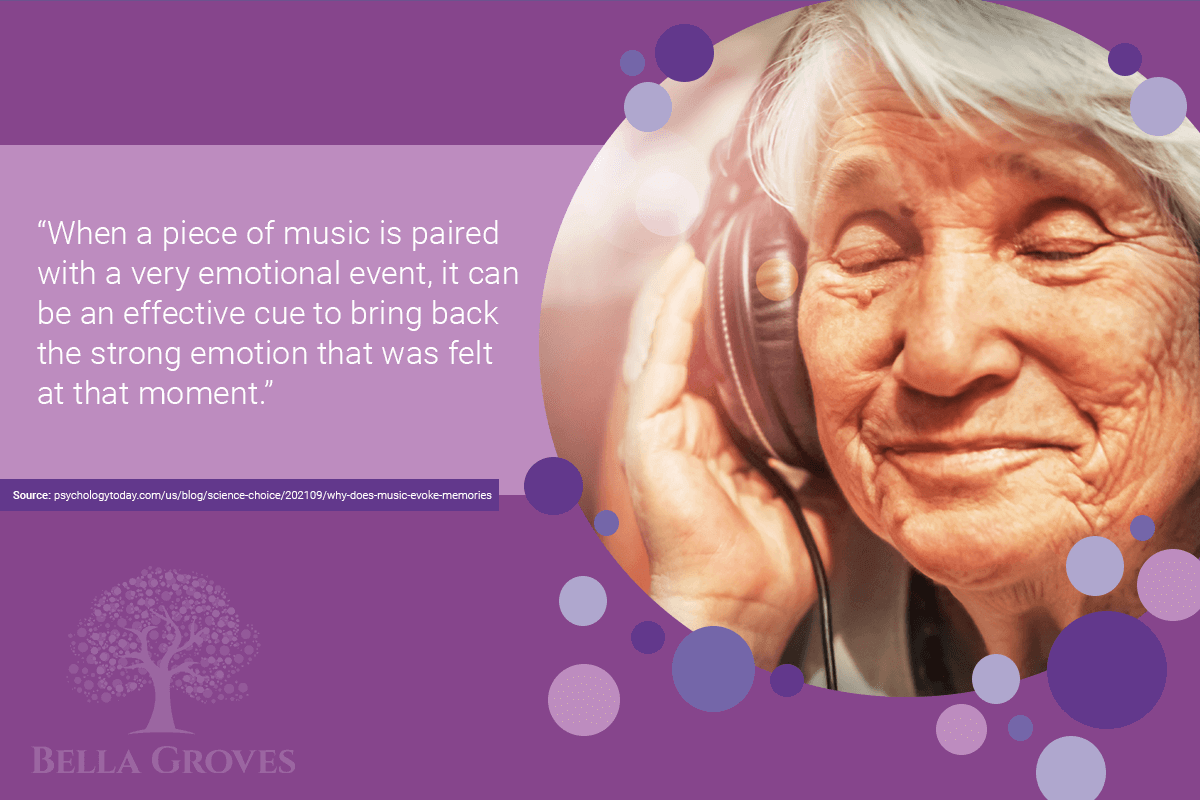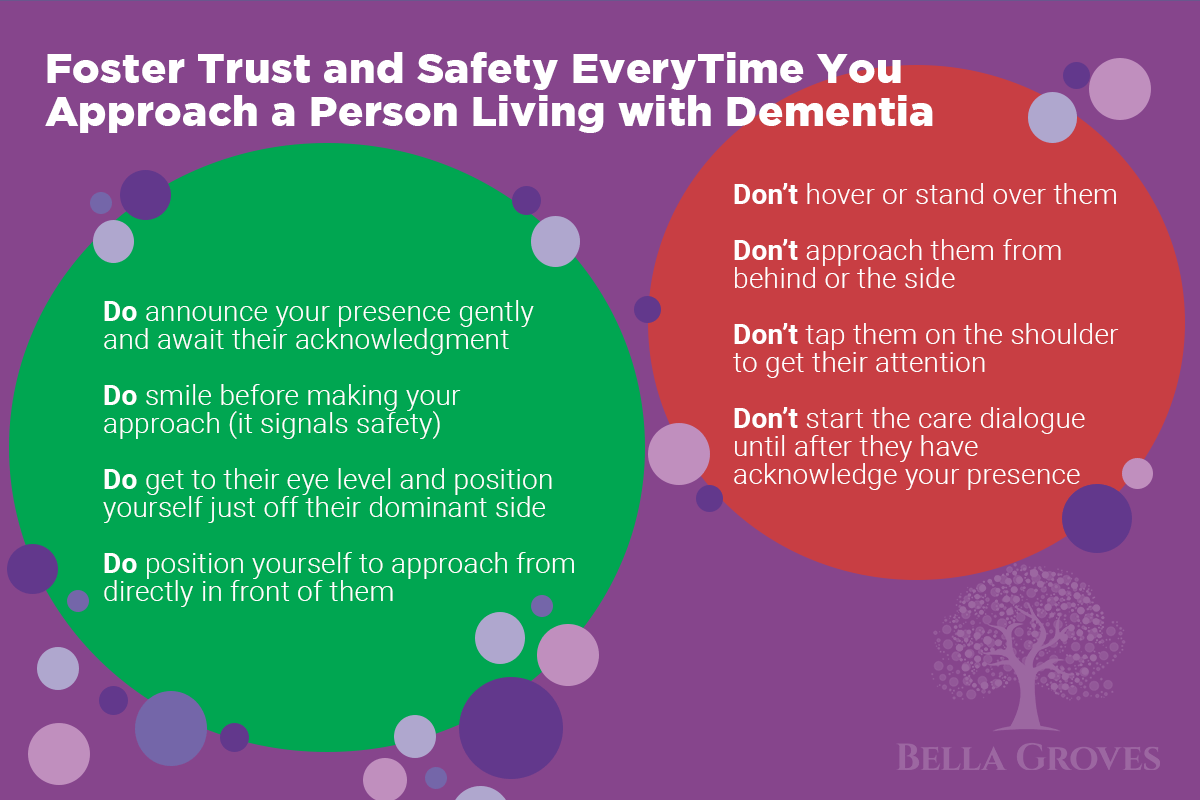
Explore the Positive Impact Music Can Have in Dementia Care
Music is a powerful thing. It can make us happy, provide us comfort, motivate us, or help us relax and sleep. It can transport us back in time, clear our minds, and boost our mood. There is a song for every emotion and occasion. And these benefits can impact anyone, including a person living with dementia.
A core value and guiding principle at Bella Groves is to create Unconditional Joy for those impacted by dementia, and music therapy is one way we do this. We have seen first-hand the positive impact music can have on those living with dementia, so we’re highlighting the benefits of music and why you should incorporate music therapy into your loved one’s routine.
Benefits of Music in Dementia Care
Promotes Socialization
Connecting with others is essential for our health and well-being. A 2020 study conducted at the Center for Music in the Brain at Aarhus University, Denmark, showed that music can provide a unique context for social bonding.
An inability to share one’s feelings with others can cause a person living with dementia to feel isolated. For example, imagine being at a dinner party with a group of people that were all speaking a language you didn’t speak. After a while, you’d feel isolated. Now, imagine being at that same dinner party every day for a year. For someone with dementia, social isolation isn’t always about being alone; it’s about feeling alone.
Fortunately, music is a universal language. When a song makes us feel good, we smile; when it calms us, we close our eyes. Music can promote connection by allowing you and a person living with dementia to feel the same emotions and bond over a general appreciation for music.
As Danish author Hans Christian Andersen once said, “Where words fail, music speaks.” This increased connection also allows people living with dementia to express themselves without using words. Facial expressions like smiling or body language like clapping are just a few ways that music can promote communication and allow a person living with dementia to showcase how they are feeling.
Helps Recall Memories & Emotions
We all have songs that we associate with certain memories. Maybe it’s a song that reminds you of your favorite family vacation or the song that was your first dance at your wedding. “When a piece of music is paired with a very emotional event, it can be an effective cue to bring back the strong emotion that was felt at that moment (psychologytoday.com).” Being able to recall these events is one of the most significant impacts of music for a person living with dementia.
The brain is a complex organ, but “there is evidence to suggest that music for memory can remain intact for persons with [dementia], even while experiencing rapid cognitive decline.” Researchers believe this is because music activates a broad network in the brain rather than a single “music area.”
Individualized music therapy should focus on the person’s experience and interests, involving music or songs from their past to evoke these memories and emotions. Identify music that’s familiar and enjoyable to them, or, if possible, let the person choose the music.
Encourages Movement
Music can also be a source of entertainment and physical activity. Whether it’s clapping, tapping a foot, or safely dancing to a song, music can get us moving, and this movement can serve as another way to connect with a person living with dementia.
Beyond listening to music, playing music, such as drum circles, can encourage movement and strengthen cognitive skills like hand-eye coordination.
Enhances Mood
Dementia can cause a person to express themselves differently. For example, your loved one may have moments of aggression or paranoia. Fortunately, another powerful impact of music and dementia care is its ability to enhance mood and reduce feelings of stress or agitation.
A review in the World Journal of Psychiatry “concluded that music is a valid therapy to potentially reduce depression and anxiety, as well as to improve mood, self-esteem, and quality of life.”
If your loved one is experiencing increased agitation, try putting on their favorite song or artist to create a more positive environment.
Improved sleep
Difficulty sleeping is a common symptom of dementia, and these sleep disturbances tend to worsen as dementia progresses. Establishing a routine is a good way to support a good night’s sleep, and implementing music into that routine can take it a step further.
According to SleepFoundation.org, “music triggers the release of dopamine, a hormone released during pleasurable activities…This release can boost good feelings at bedtime and address pain, another common cause of sleep issues. Music improves sleep through calming parts of the autonomic nervous system, leading to slower breathing, lower heart rate, and reduced blood pressure.”
If your loved one has trouble sleeping, try playing soothing music at night before bed to create a calm, peaceful mood and promote sleep.
Music Therapy at Bella Groves
At Bella Groves, Life Enrichment Programs offered at our residential community in Bulverde, Texas, are designed to help residents make important contributions that are meaningful to them. Our Executive Director, Angela Mattingly, is a board-certified music therapist (MT-BC) and is trained to optimize the potential impacts of music therapy by providing multifaceted, individualized music experiences.
In addition, Bella Groves has partnered with a local university to host and supervise an intern completing their bachelor’s in music therapy that will facilitate individualized and group music therapy sessions at our community.
We are committed to delivering exceptional memory care to individuals in the San Antonio, Texas, area. We encourage you to add music to your dementia care plan or reach out to our team to learn more about our services and communities.


